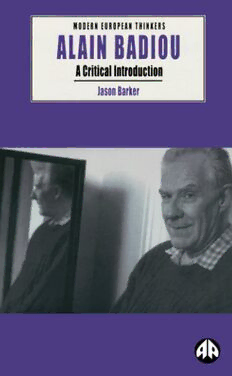
Alain Badiou: A Critical Introduction PDF
Preview Alain Badiou: A Critical Introduction
IIIIRN IIBIPIAN TllHlBS ALAIN BADIOU AC ritical Introduction Jason Barker Alain Badiou Modern European Thinkers Series Editor: Professor Keith Reader, University of Newcastle upon Tyne The Modern European Thinkers series offers low-priced introductions for students and other readers to the ideas and work of key cultural and political thinkers of the post-war era. Jean Baudrillard Mike Cane Edgar Morin Myron Kofman Pierre Bourdieu Jeremy F. Lane Walter Benjamin Esther Leslie Andre Gorz Conrad Lodziak and Jeremy Tatman Gilles Deleuze John Marks Guy Hocquenghem Bill Marshall Georges Bataille Benjamin Nays Regis Debray Keith Reader Julia Kristeva Anne-Marie Smith Alain Badiou A Critical Introduction Jason Barker 4~ Pluto Press LONDON First published 2002 by Pluto Press 345 Archway Road, London N6 5AA www.plutobooks.com Copyright © Jason Barker 2002 The right of Jason Barker to be identified as the author of this work has been asserted by him in accordance with the Copyright, Designs and Patents Act 1988. British Library Cataloguing in Publication Data A catalogue record for this book is available from the British Library ISBN 978 0 7453 18004 paperback Library of Congress Cataloging-in-Publication Data Barker, Jason. Alain Badiou : a critical introduction / Jason Barker. p. cm. - (Modern European thinkers) Includes bibliographical references and index. ISBN 978-0-7453-1801-1 (hard) - ISBN 978-0-7453-1800-4 (pbk.) 1. Badiou, Alain. 2. Political scientists-Biography. 3. Political science-Philosophy. 4. Philosophy, French-20th century. 1. Title. II. Series. JC229.B33 B37 2002 320'.092-dc21 2001003499 11 10 09 08 07 06 05 04 03 02 9 8 7 6 5 4 3 2 1 Designed and produced for Pluto Press by Chase Publishing Services, Fortescue, Sidmouth EX 10 9QG Printed and bound in Great Britain by Marston Book Services Limited, Didcot Contents Acknowledegments vii Abbreviations viii Introduction 1 1. Maoist Beginnings 13 2. The Science of Being 39 3. The Event of Non-Being S9 4. The Politics of Truth 83 S. The Cult of Deleuze 111 6. The Ethics of Philosophy 130 Appendix - Some Basic Principles of Set Theory 149 Notes and References IS6 Bibliography 171 Index 179 Acknowledgements I would like to thank Christopher Norris for his expert comments and guidance throughout the researching and writing of this book, particularly the many discussions which were a regular source of inspiration. My sincerest thanks are also due to Martin Jenkins for his support and belief in this project right from the very beginning. Special thanks to Jean-Jacques Lecercle for kindly agreeing to read one of several draft versions of the manuscript, and to Peter Hallward for sending me extracts of his own work in progress. I am grateful to Andy Goffey and the equally talented Benoit Letourneau for - quite unbeknown to them I'm sure - setting my thoughts on the right track. I should also like to thank Alain Badiou for his generous invi tation to partiCipate in the colloquium on his work, held at Bordeaux in October 1999, and for providing me with the appropriate biographical details. I must express my appreciation to the staff and acknowledge the excellent facilities at Cardiff University, and thank Gary Winterbottom for his first-rate hospitality on my numerous visits to Cardiff. Thanks to the staff at Pluto Press, particularly Melanie Patrick, Robert Webb and Anne Beech, and to Veronique Serafinowicz for her editorial comments. Needless to say any lingering inconsistencies in my use of Badiou's terminology are solely down to me. Abbreviations I refer the reader to my bibliography for full details of the following works. All references relate solely to the French editions with one exception. * In this case corresponding page numbers of the English edition are provided in italics. CM The Concept of Model TC Theory of Contradiction I Of Ideology NR The Rational Kernel of the Hegelian Dialectic TS Theory of the Subject PP Can Politics Be Thought? EE Being and the Event MP Manifesto for Philosophy C Conditions E Ethics o *Deleuze. The Clamour of Being AM Summary of Metapolitics CT Short Treatise on Transitional Ontology PMI Light Inaesthetic Manual DO An Obscure Disaster Introduction: The Unnameable It is 5 a.m. Paris awakens to barricades, trees strewn in the streets. The protest is, according to General de Gaulle, difficult to grasp. Unforeseeable, it profoundly shakes the government. A radical protest is sweeping France and provoking the most important social movement the country has ever known: ten million strikers. A shock. 1 The philosophy of Alain Badiou is an impossible wager. Arguably the most ambitious speculative thinker since Hegel and the most materi alist since Lucretius, Badiou defies the liberal diplomacy of the linguistic turn and the crisis of Western metaphysics in a heroic effort to rescue philosophy from its time in exile. His intervention in philosophy today forces us to interrogate most if not all of our post modern beliefs: from the death of Marxism and the deconstruction of the subject to the revival of neo-Kantianism and scientific prag matism, Badiou pierces the common sense of each and everyone in order to reveal, against a backdrop of conventional wisdom, philos ophy as a militant discourse on truth. But who is Badiou? And what are we to make of a 'militant' philosopher so conspicuously deprived of latter-day philosophical allies? Born in Rabat, Morocco in 1937, Badiou studied at the Ecole Normale Superieure in Paris between 1956 and 1961, obtaining his licence and maftrise from the Sorbonne. In 1958 he helped to found the PSU (United Socialist Party), an offshoot of the French Socialist Party strongly opposed to the French Algerian War. Like many young political activists of his generation, Badiou's anti-imperialist consciousness would prove paramount in dictating the future path of his intellectual life. He wrote the first of several novels - Almagestes (1964) - and in 1967 began participating in a Spinoza research group created by the Marxist philosopher Louis Althusser. The same year he was invited to join Althusser's 'Philosophy Course
